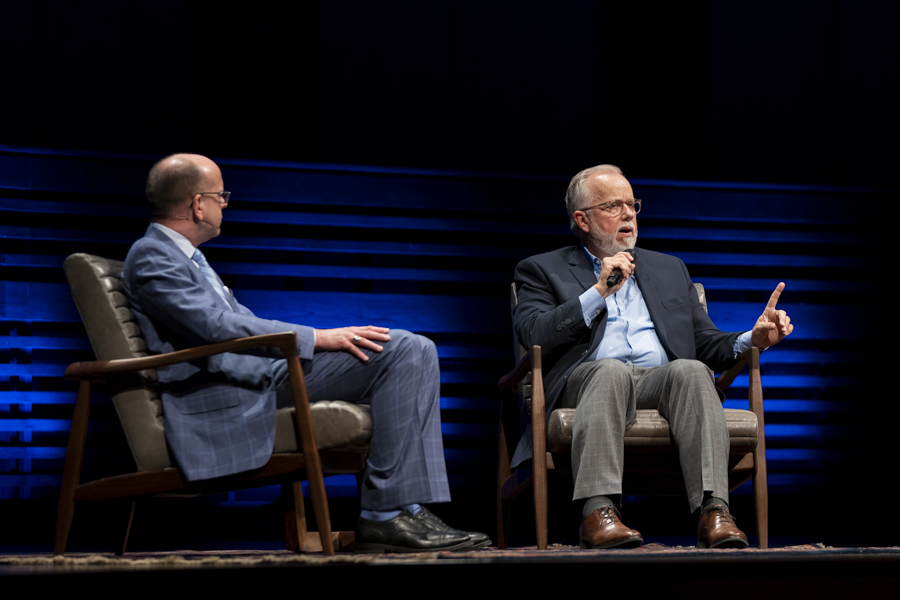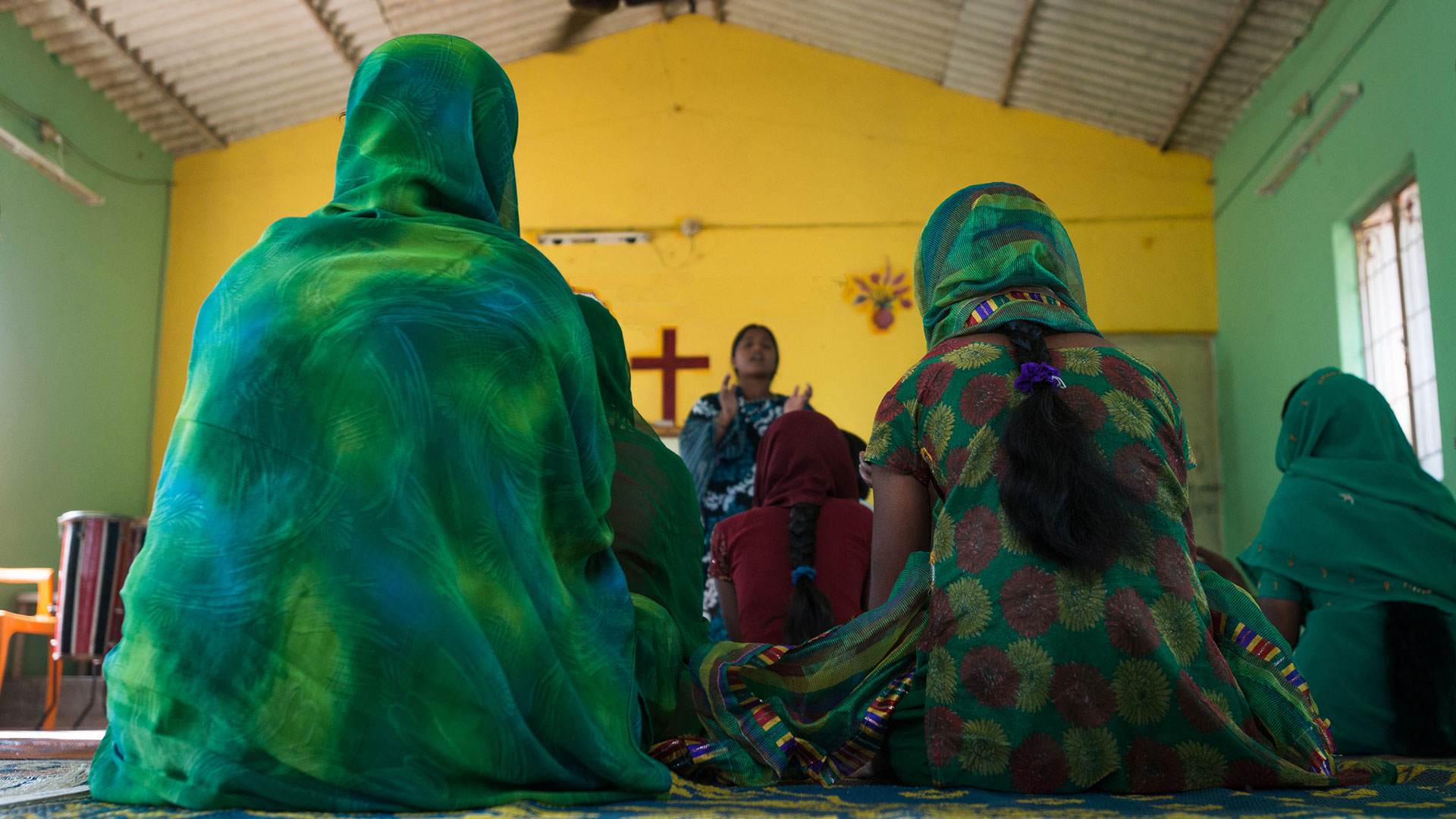
FORT WORTH (BP) – In a conversation during chapel at Southwestern Baptist Theological Seminary Tuesday (Sept. 14), Southern Baptist Convention President Ed Litton addressed topics ranging from God’s work through suffering, racial reconciliation, the crisis facing the SBC Executive Committee and the accusations of plagiarism that have dogged him since early in his presidency.
SWBTS President Adam W. Greenway opened the dialogue by asking Litton to address “what has come to be known as the sermon plagiarism controversy.”
“I take preaching very seriously,” Litton said before recounting the events surrounding the sermon series in question, parts of which tracked closely to a series preached by former SBC President J.D. Greear.
Litton, longtime pastor of Redemption Church in Saraland, Ala., near Mobile, said the prospect of preaching through Romans was “intimidating” and during his preparation, he listened to Greear’s series from the same book.
“And I was really moved by the way he handled some very challenging passages in Romans,” Litton said. When Litton called Greear to ask about using some of his material for the series at Redemption Church, Greear gave his permission.
Litton admitted that portions of his sermon “line up” with Greear’s sermons, but added “I don’t consider that plagiarism. But let me tell you where my sin was. My sin was that I did not credit him to my church. I’ve been asked why, and I’m a little mystified by that too, because I’m very transparent with my people.”
Litton said he has repented to his church for not crediting Greear and has been “fasting” from listening to preaching.
“I have a capacity to remember statements that are made in an audible sermon that I hear that’s a little too good,” Litton said. “Sometimes it gets mixed up.”
The controversy has been very painful, Litton said.
“I feel like that I’m in a refiner’s fire,” he said. “It’s easy to criticize the source of the fire, but nowhere does the Scripture tell us to do that. Scripture tells us to put our eyes on the Refiner. … I have accepted the reality of this fire, and I embrace it by the grace of God.”
Litton said he has learned more about his own insecurity “that needed praise for my preaching,” but that “God has been in the process of burning out. And it is a painful thing.”
Greenway then asked Litton to share with seminarians and pastors any “pastoral words” drawn from what he has been through.
“It is frightening to think about what can happen to your reputation. It is terrifying,” Litton said. “But that is a danger. … Proverbs 29 says ‘the fear of man is a snare.’”
Southern Baptists are terrified of being ruined in public, Litton said, adding that when he has asked others to serve in Southern Baptist life, he is often asked “Will they do to me what they’ve done to you?”
“What we’ve done is created an atmosphere that is quite toxic,” he said. “Good people will not serve for fear that a mistake or a sin that they committed five years ago could be brought up on YouTube or that they could be paraded out or embarrassed or ashamed. … It’s not fun. But by the grace of an almighty God who died naked on a cross for me, you can overcome it. …
“Repent often of pride.”
Southern Baptists have the best tools and training for ministry, he said, “but the reality is, nothing happens apart from brokenness.”
People don’t remember sermons, but they will remember that you “take time with those that are broken, that you hug and pray for those who ask you to pray for them,” he said.
Litton went on to discuss brokenness in his own life, not just from recent controversy, but from tragedy.
“God uses our brokenness, and He uses the pain and the things that we suffer more than anything else to communicate His Gospel to people,” Litton said.
Litton said his “street cred” in his own city is the death of his first wife Tammy 14 years ago.
“People know that at 25 years of marriage, a woman I desperately loved … was suddenly, instantly killed,” he said. “My life spun off. I didn’t know if I’d ever want to preach again. I didn’t know if I wanted to live.”
Litton said God’s grace as well as a loving church and family sustained him. He also shared how his current wife, Kathy, experienced a similar tragedy when her husband Rick was killed 19 years ago.
“God has blessed us and graced us with a ministry to broken people,” he said. “… It’s a stewardship of your suffering that will give you more progress in the Gospel than you ever imagined as a pastor.”
Reflecting on the 2021 SBC Annual Meeting in June, during which he was elected, Litton said he has fought the perception that the SBC has taken a “moderate” turn.
“Nothing about our theological statements changed,” he said he told secular media outlets. “And frankly they’re not going to. There’s not a moderate left in the Southern Baptist Convention. We’re all on a spectrum of conservative. We believe in the fundamentals of Scripture.”
But, he said, messengers to the meeting sent a clear message that “we’re tired of abuse, and it has to be dealt with. It needs to be dealt with. It needs to be looked at thoroughly.”
The focus on abuse is not a “witch hunt,” Litton said, but “an opportunity to pave the way for the future, and ultimately to get back to the Gospel.”
Despite conflict, Litton said he is positive about the future of the Southern Baptist Convention. “We are a grassroots people. We are not a top-down denominational structure.”
This structure allows average Southern Baptists to have great influence, he said, just as they did during the Conservative Resurgence. The concern now, however, is not a slide into liberalism, but a slide into fundamentalism.
The Baptist Faith and Message “is sticky enough to hold us together,” Litton said, “and at the same time allow us to have a variety of culture. … We have variety and different ways of reaching people.”
That room for diversity allows for racial reconciliation as well, something that Litton has been involved in a long time.
“Reconciliation is a call of God on us,” Litton said. “We are reconciled to Christ, and we are to reconcile to others.”
Litton shared a bit of the troubling racial history of both the SBC and the city of Mobile and said of racial reconciliation: “It’s not the culture that’s pressing us to do this. It’s the Gospel that’s pressing us to do this.”
Through years of weekly meetings with other pastors in Mobile, God has brought “miraculous” reconciliation, Litton said.
“A lost and dying world sometimes knows our theology better than we do,” he said, “and they expect us to act like Jesus. So we need to act like Jesus.”
Litton and Greenway ended the conversation looking forward to next year’s SBC Annual Meeting as well as next week’s SBC Executive Committee meeting in Nashville, during which the third-party review of the EC’s handling of sex abuse cases will be at the forefront.
“What’s up to the Executive Committee now is to fully fund [the review] and to release at least limited attorney-client privileges,” Litton said.
“… A lot is at stake. The Gospel is at stake. Our credibility is at stake. Our unity is at stake.”
Litton also stressed the important of maintaining Southern Baptist polity throughout the investigative process.
“We are autonomous churches, in autonomous associations, with autonomous state conventions and an autonomous national convention,” he said.
Several times during the dialogue, Litton asked for prayer—for himself, for unity, for racial reconciliation, for the EC review and other issues.






















